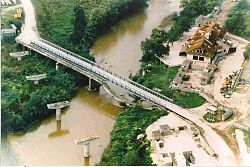Bevil Mabey
[1][2] Bevil Mabey was educated at Tonbridge School and, from 1935, at St Catharine's College, Cambridge, where he read anthropology, archaeology and history.
[3] These were extensively deployed in rough terrain in developing countries, and have been used for military purposes, helping British, US and Nato troops establish lines of communication in offensive and peacekeeping operations.
[3] Mabey & Johnson also built several permanent steel box-girder bridges, after acquiring the South Wales-based Fairfield shipbuilding and engineering company.
In 2005, Mabey & Johnson was accused of making excessive profits in aid projects in the Philippines, building what critics described as "bridges to nowhere".
[7] Further allegations of corruption, relating to sales in Jamaica, the Dominican Republic and Panama, surfaced in January 2008,[8] after which Mabey Group admitted it may have paid bribes to the regime of Saddam Hussein in order to win business in Iraq, under the Oil-for-Food Programme.
[9] In September 2009, Mabey & Johnson became the first major British company to be convicted of foreign bribery after admitting it had systematically paid bribes around the world to win contracts.
